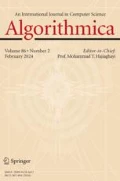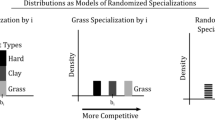Abstract
We study several natural problems in distributed decision-making from the standpoint of competitive analysis; in these problems incomplete information is a result of the distributed nature of the problem, as opposed to the on-line mode of decision making that was heretofore prevalent in this area. In several simple situations of distributed scheduling, the competitive ratio can be computed exactly, and the different ratios can be used as a measure of the value of information and communication between decision-makers. In a more general distributed scheduling situation, we give tight upper and lower bounds on the competitive ratio achievable in the deterministic case, and give an optimal randomized algorithm with a much better competitive ratio.
Similar content being viewed by others
References
N. Alon, Personal communication, 1992.
K. Arrow,The Economies of Information, Harvard University Press, 1984.
K. Arrow, Personal communication, Stanford University, 1987.
S. Ben-David, A. Borodin, R. Karp, G. Tardos, and A. Wigderson, On the Power of Randomization in Online Algorithms,Proceedings of the 22nd Annual ACM Symposium on Theory of Computing, 1990, pp. 379–386.
R. A. Baeza-Yates, J. C. Culberson, and G. J. E. Rawlins, Searching in the Plane,Information and Computation,106 (1993), 234–252.
A. Borodin, S. Irani, P. Raghavan and B. Schieber, Competitive Paging with Locality of Reference,Proceedings of the 23rd Annual ACM Symposium on Theory of Computing, 1991, pp. 249–259.
S. Baruah, O. Koren, B. Mishra, A. Raghunathan, L. Rosier, and D. Shasha, On-Line Scheduling in the Presence of Overload,Proceedings of the 32nd Annual Symposium on Foundations of Computer Science, 1991, pp. 100–110.
A. Borodin, N. Linial, and M. Saks, “An Optimal Online Algorithm for Metrical Task Systems,”Proceedings of the 19th Annual ACM Symposium on Theory of Computing, 1987, pp. 373–382.
A. Blum, P. Raghavan, and B. Schieber, Navigating in Unfamiliar Geometric Terrain,Proceedings of the 23rd Annual ACM Symposium on Theory of Computing, 1991, pp. 494–504.
D. Coppersmith, P. Doyle, P. Raghavan, and M. Snir, Random Walks on Weighted Graphs, and Application to On-line Algorithms,Proceedings of the 22nd Annual ACM Symposium on Theory of Computing, 1991, pp. 369–378.
X. Deng, T. Kameda and C. H. Papadimitriou, How To Learn an Unknown Environment,Proceedings of the 32nd Annual Symposium on Foundations of Computer Science, 1991, pp. 298–303.
X. Deng and S. Mahajan, Infinite Games: Randomization, Computability and Applications to Online Problems,Proceedings of the 23rd Annual ACM Symposium on Theory of Computing, 1991, pp. 289–298.
X. Deng and C. H. Papadimitriou, Exploring an Unknown Graph,Proceedings of the 31st Annual Symposium on Foundations of Computer Science, 1990, pp. 355–361.
A. Fiat, D. P. Foster, H. Karloff, Y. Rabani, Y. Ravid, and S. Vishwanathan, Competitive Algorithms for Layered Graph Traversal,Proceedings of the 32nd Annual Symposium on Foundations of Computer Science, 1991, pp. 288–297.
A. Fiat, Y. Rabani, and Y. Ravid, Competitivek-Server Algorithms,Proceedings of the 31st Annual Symposium on Foundations of Computer Science, 1990, pp. 454–463.
A. Feldmann, J. Sgall, and S. -H. Teng, Dynamic Scheduling on Parallel Machines,Proceedings of the 32nd Annual Symposium on Foundations of Computer Science, 1991, pp. 111–120.
E. F. Grove, The Harmonic Onlinek-Server Algorithm is Competitive,Proceedings of the 23rd Annual ACM Symposium on Theory of Computing, 1991, pp. 260–266.
M. R. Garey and D. S. Johnson,Computers and Intractability, A Guide to the Theory of NP-Completeness, Freeman, New York, 1979.
S. Irani, Coloring Inductive Graphs On-Line,Proceedings of the 31st Annual Symposium on Foundations of Computer Science, 1990, pp. 470–479.
S. Irani, and Yuval Rabani, On the Value of Information in Coordinated Games,Proceedings of the 34th Symposium on Foundations of Computer Science, 1994, pp. 12–21.
R. Klein, Walking an Unknown Street with Bounded Detour,Proceedings of the 32nd Annual Symposium on Foundations of Computer Science, 1991, pp. 304–313.
A. R. Karlin, M. S. Manasse, L. Rudolph, and D. D. Sleator, Competitive Snoopy Caching,Algorithmica,3(1988), 79–119.
P. C. Kanellakis and C. H. Papadimitriou, The Complexity of Distributed Concurrent Control,Proceedings of the 22nd Annual Symposium on Foundations of Computer Science, 1981, pp. 185–197.
H. Karloff, Y. Rabani, and Y. Ravid, Lower Bounds for Randomizedk-Server and Motion-Planning Algorithms,Proceedings of the 23rd Annual ACM Symposium on Theory of Computing, 1991, pp. 278–288.
L. Lovasz, M. Saks, and W. A. Trotter, An On-line Graph Coloring Algorithm with Sublinear Performance Ratio, TM-ARH-013014, Bellcore.
M. S. Manasse, L. A. McGeoch, and D. D. Sleator, “Competitive Algorithms for On-Line Problems,”Proceedings of the 20th Annual ACM Symposium on Theory of Computing, 1988, pp. 322–333.
C. H. Papadimitriou and J. Tsitsiklis, Intractable Problems in Control Theory,SIAM Journal on Control and Optimization,24 (1986), 639–654.
C. Papadimitriou and M. Yannakakis, Shortest Paths Without a Map,Proceedings 16th ICALP, 1989, pp. 610–620. Also in the special issue ofTheoretical Computer Science,84 (1991), 127–150.
C. H. Papadimitriou and M. Yannakakis, On the Value of Information in Distributed Decision-Making,Proceedings 10th PODC, 1991, pp. 61–64.
P. Raghavan, Randomized Rounding and Discrete Ham-Sandwich Theorems. Ph.D. Thesis, University of California, Berkeley, July 1986.
P. Raghavan and M. Snir, “Memory vs. Randomization in Online Algorithms,”IBM Journal of Research and Development,38 (1994), 683–707.
D. D. Sleator and R. E. Tarjan, Amortized Efficiency of List Update and Paging Rules,Communications of the ACM,28 (2) (1985), 202–208.
D. B. Shmoys, J. Wein, and D. P. Williamson, Scheduling Parallel Machines On-line,Proceedings of the 32nd Annual Symposium on Foundations of Computer Science, 1991, pp. 131–140.
S. Vishwanathan, Randomized On-line Coloring of Graphs,Proceedings of the 31st Symposium on Foundations of Computer Science, 1990, pp. 464–469.
H. S. Witsenhausen, A Counterexample in Stochastic Optimum Control,SIAM Journal on Control and Optimization,6 (1968), 138–147.
Author information
Authors and Affiliations
Additional information
Communicated by C. K. Wong.
The research of Xiaotie Deng was supported by an NSERC grant and that of C. H. Papadimitriou was supported by an NSF grant.
Rights and permissions
About this article
Cite this article
Deng, X., Papadimitriou, C.H. Competitive distributed decision-making. Algorithmica 16, 133–150 (1996). https://doi.org/10.1007/BF01940643
Received:
Revised:
Issue Date:
DOI: https://doi.org/10.1007/BF01940643




